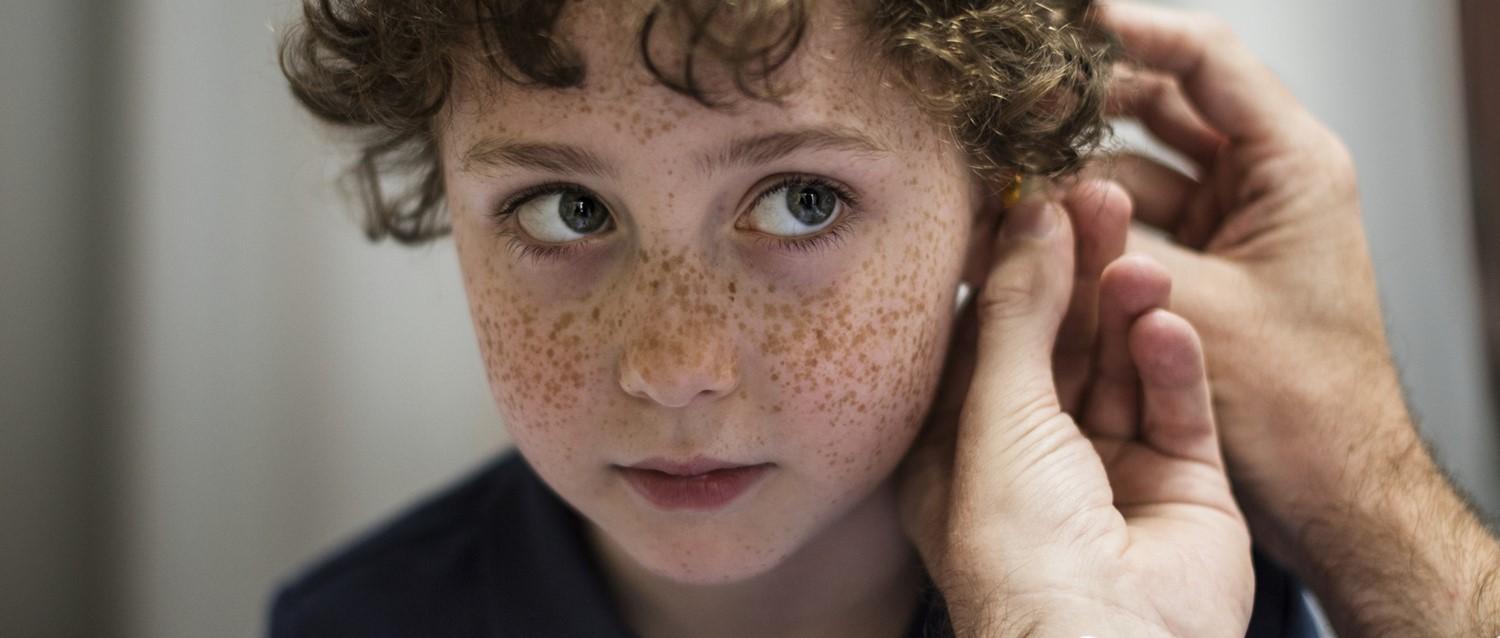
Signes d'acouphènes à surveiller chez les enfants
Peer reviewed by Dr Sarah Jarvis MBE, FRCGPLast updated by Natalie HealeyLast updated 6 Feb 2018
- TéléchargerTélécharger
- Partager
Si vous pensez aux acouphènes, vous associerez probablement ce trouble auditif à la génération plus âgée, peut-être à ceux qui ont assisté à quelques concerts de rock de trop. Mais détrompez-vous. Les acouphènes touchent également les jeunes : on estime qu'un enfant dans chaque classe au Royaume-Uni en est atteint.
Dans cet article :
Poursuivre la lecture ci-dessous
Qu'est-ce qu'un acouphène ?
Tinnitus is a ringing, humming, pulsing or hissing sound in your ear. The sounds, which vary from person to person, are created by your own hearing system. It's the feeling of hearing noises when no sound is actually present.
The condition is not just for adults. But often kids think that hearing these sounds is normal, so might not tell their parents. Tinnitus may seem to get worse when they're anxious and could lead to difficulty sleeping.
But many parents are unaware that children can suffer from tinnitus in the first place. In fact, research published in 2018 from the British Tinnitus Association (BTA) showed worrying statistics around parents' knowledge of the condition. Just under a third (32%) of UK parents are aware that children under the age of 10 can have tinnitus, and just 37% think it can affect children aged 10 to 16 years old.
Choix du patient pour Autres signes et symptômes

Signes et symptômes
Comment ne plus se sentir ballonné en permanence ?
Que vous ayez avalé un repas trop vite ou que vous subissiez des changements hormonaux, la sensation de ballonnement s'accompagne souvent d'un sentiment de fatigue et d'épuisement. Nous examinerons ici les causes des ballonnements et ce que vous pouvez faire pour y remédier.
par Victoria Raw

Signes et symptômes
Apathie
La déception et le sentiment d'abattement font partie de la vie. Mais il est très important d'être capable de surmonter les déceptions afin de ne plus se sentir apathique. Une période temporaire d'apathie est donc normale. En revanche, une apathie de longue durée n'est pas normale et peut entraîner de graves problèmes de qualité de vie.
par le Dr Colin Tidy, MRCGP
Signs of tinnitus in children
Children with tinnitus are often unable to vocalise what it is the're hearing or experiencing, and so often display other more subtle signs of the condition.
"While unsurprisingly, most parents would associate their child reporting sounds in their ears or head with tinnitus - the problem is that children are often unable to explain what it is they're experiencing so unless they are directly asked the question by a parent, teacher or medical professional, it can often be overlooked," says David Stockdale, chief executive of the BTA.
"They may be struggling alone and so may often display more subtle signs, such as appearing distracted or becoming anxious which can also have a real impact on their general quality of life, including their behaviour and learning at school."
Poursuivre la lecture ci-dessous
What causes tinnitus in children?
As with adults, there are many reasons why children may experience tinnitus.
Veronica Kennedy, consultant audiovestibular physician at Bolton NHS Foundation Trust, and former chair of the BTA's Professional Advisers’ Committee, explains: "For most children there is no significant underlying condition (pathology). Some children can be aware of tinnitus where their ears are blocked due to wax or glue ear. Some may have a hearing loss for other reasons."
A temporary hearing loss associated with tinnitus might occur after noise exposure. For instance, the child may have attended a loud concert. But with repeated exposure, this hearing problem can become permanent.
"A very small number of children have tinnitus in association with a medical condition so all children with troublesome tinnitus should be referred to their local paediatric audiology service or ENT clinic," Kennedy stresses.
What parents should do
If you're concerned that your child may have tinnitus, it's best to visit your GP. Kennedy reveals that in most cases of tinnitus in children, the outcome is positive. But it can also be a source of worry for a child if it's not addressed.
"For most children and teens with tinnitus, an explanation of the condition and reassurance is all that is needed. Some benefit from strategies to help cope with the tinnitus and some need strategies to cope with stress and feelings of anxiety. A small number of children need psychological support."
In one study of tinnitus and anxiety/depression in children, 32% had significant anxiety and 14.5% depression. Those with depression experienced tinnitus for 24 months compared to those without depression (17 months).
"But another feature that indicates a good prognosis is that few adults troubled with tinnitus recall having it as children," Kennedy concludes.
You can contact the BTA for advice and to access resources for children with tinnitus.
Historique de l'article
Les informations contenues dans cette page ont été évaluées par des cliniciens qualifiés.
6 Feb 2018 | Dernière version

Demandez, partagez, connectez-vous.
Parcourez les discussions, posez des questions et partagez vos expériences sur des centaines de sujets liés à la santé.

Vous ne vous sentez pas bien ?
Évaluez gratuitement vos symptômes en ligne